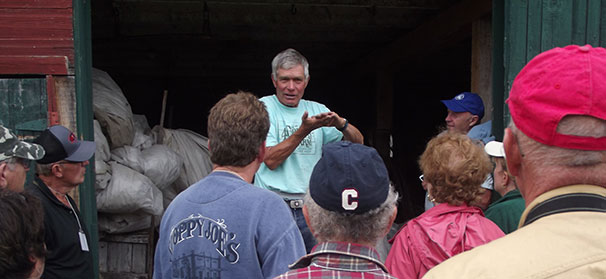
Jan 16, 20144 Corners Farm puts diversified slant on success
For more than three decades, Bob and Kim Gray have successfully navigated their way to a diversified growing operation in West Newbury, Vt.
Their 225-acre 4 Corners Farm is located in the Connecticut River Valley, overlooking the White Mountains. The farm grows a wide variety of vegetables along with blueberries, strawberries and raspberries, many of which can be found under more than a dozen greenhouses and high tunnels located throughout the sprawling property. The farm also has a herd of Jersey milk cows.
A busy farm stand within the massive, 200-year-old original barn is one outlet for 4 Corners’ produce, with other farmers’ markets in the region also being lucrative. The Vermont Agency of Agriculture lists more than 50 weekly farmers’ markets in the region.
“We specialize in strawberries (10 acres) and delicious greenhouse tomatoes,” Bob Gray told members of the North American Strawberry Growers Association (NASGA) during their summer tour. “When my wife and I got together, she always wanted to farm. We put an ad in the paper that said we were a young couple looking for a place to farm. An older gentleman answered it, and we were on that farm for three years, getting a pretty good start. He died and the farm got tied up in the estate. Then we found the farm we have now and we’ve been there ever since.”
The couple are both former ski racers – Bob a two-time Olympian on the U.S. Nordic Ski Team, Kim an alpine downhill specialist. Bob, 74, said he still takes to the snow extensively in the winter offseason.
“When I’m not skiing, I’m thinking about skiing,” he said.
During the NASGA tour, Kim described the greenhouse and tunnel operations while Bob conducted a wagon trip through the strawberry fields.
“We started with one (green)house some 30 years ago,” she said. “We ended up changing them around and raising them up because they weren’t big enough. We have some unheated tunnels. We have some ground and air heat in half of them with a hot water pipe running under the beds to keep the soil up. We use wood heat and propane with big furnaces.
“We use wooden beds to keep things organized,” she said. “We do our own compost. We use a lot of compost in the beds and some regular fertilizer, too.”
It’s not uncommon for the cherry tomatoes, and other crops such as Piccolinos (larger than a cherry tomato and grown in clusters), to have trellised wires guiding their stems, which can trace 15 feet or more along the plastic, with the plants rising several feet high.
Bob’s 35 years in farming started when he became enamored, during his early 30s, with the success of a nearby farmers’ market. Having visited it with a supply of fruit and berries he had grown on his property as part of the “back-to-the-land movement,” he was amazed to come away with as much as $600 in his pocket.
“And I haven’t worked for anyone else since then,” he said.
He gushed with enthusiasm when describing the rise of specialty crops in a region long known for its dairy production.
“We’re really blessed to have so much good farmland in a mountainous state,” he said. “There are thin plots in the river valleys with really good, fertile sandy soil.”
The farm produces everything from asparagus to winter squash. Dotting the fields are beets, broccoli, Brussels sprouts, cabbage, cauliflower, corn, cucumbers, dried beans, eggplant, beans, mesclun mix, onions, peppers, potatoes and a wide assortment of plants, herbs and seeds.
The Grays are looked at as trailblazers for agriculture in the region. During the NASGA tour, the Grays received kudos from some of the other farm operators who were visited, including Dave Marchant, owner of River Berry Farm in Fairfax with his wife Jane. The efforts of 4 Corners Farm and others to sell directly to customers are not lost on their associates.
“Bob is one of the people we’ve looked at – as have a number of other folks – for how to do things right in this state,” Marchant said.
While Marchant and others visited are organic farmers, Bob Gray said he’s happy with the success he’s found as a conventional operator.
“At this point, everybody wants organic,” he said. “Some are religious about it. We’re not organic and we are surviving. The tomatoes we grow in the greenhouse are probably 90 percent organic. Our strawberries are not organic, and I don’t know that I would ever want to grow them organically.”
















